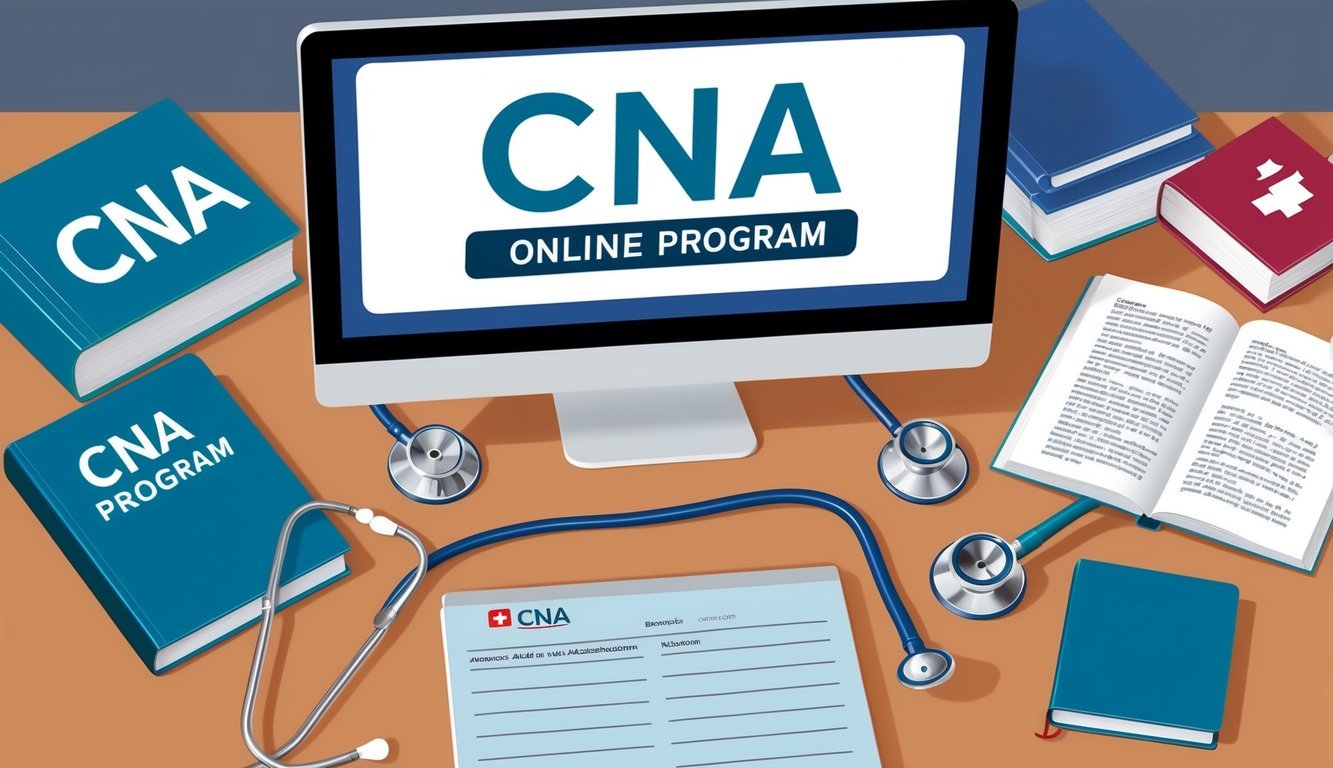If you’re looking to enter the healthcare field quickly, a 4-week online CNA program offers a practical pathway. These accelerated programs provide the necessary training for you to become a certified nursing assistant in a matter of weeks, allowing you to jumpstart your career in a high-demand field.
With a blend of online coursework and hands-on skills training, you can balance your education with personal commitments.
Many community colleges and accredited institutions now offer these condensed programs, making it easier than ever to earn your certification.
You may have questions about the costs and curriculum, which can vary significantly.
Exploring options from programs like those found at NursingProcess.org can provide you with insights into what to expect.
As a prospective student, it pays to research your options thoroughly.
Course length, content, and pricing can differ, but you will find that most programs equip you with essential skills in patient care, legal and ethical standards, and more.
Investing in a comprehensive online CNA program can set you on the path to a rewarding career while meeting the needs of a rapidly growing industry.
Exploring the Role of Certified Nursing Assistants

As a Certified Nursing Assistant (CNA), you play a vital role in the healthcare field.
Your primary responsibility is to support patients with daily living activities, enabling them to maintain dignity and comfort.
Key Responsibilities of a CNA:
| Task | Description |
|---|---|
| Patient Care | Assisting with bathing, dressing, and grooming. |
| Vital Signs | Checking blood pressure, temperature, and pulse. |
| Mobility Assistance | Helping patients move around and repositioning them. |
| Communication | Interacting with patients and relaying information to nursing staff. |
In healthcare facilities such as hospitals and nursing homes, CNAs are essential.
They ensure that patients receive timely care and emotional support.
Your work also involves monitoring patient conditions and assisting with medical equipment.
This ability makes you an integral part of a healthcare team.
The skills you develop during a 4-week online CNA program prepare you for these responsibilities, ensuring you are ready to enter the workforce. You will learn not only technical skills but also how to provide compassionate care to those in need.
If you are considering a career as a nursing assistant, resources like this list of online CNA programs can help you find the right educational path.
Understanding 4-Week Online CNA Programs
4-week online CNA programs offer a fast route to becoming a Certified Nursing Assistant.
These programs combine theoretical knowledge with practical skills essential for patient care, allowing you to complete your training efficiently.
Program Overview
A 4-week online CNA program is typically a state-approved training course designed for those aspiring to become certified nursing assistants.
These programs provide a blend of online coursework and hands-on clinical training, enabling you to develop personal care skills and gain essential knowledge in anatomy, medical terminology, and patient care.
Most programs meet federal and state regulations, ensuring you qualify for the nurse aide registry upon completion.
Fast-track options are available, allowing you to start your healthcare career quickly.
You will learn crucial topics like infection control and vital signs, which are vital for effective patient monitoring.
Admissions Requirements
Before enrolling in a 4-week online CNA program, you must meet certain admissions requirements.
Generally, applicants should have a high school diploma or GED equivalent.
Additionally, many programs require a criminal background check, drug screening, a TB test, and a physical examination to ensure you are fit for healthcare work.
These prerequisites help maintain a safe environment for patients.
It’s important to check specific program requirements at institutions, as they can vary.
Ensure you are prepared with all necessary documentation to expedite your enrollment process.
Curriculum and Competencies
The curriculum of online CNA programs focuses on the competencies necessary for effective patient care.
You will cover a variety of topics essential for your role, such as:
- Vital Signs: Understanding how to measure and interpret vital signs.
- Personal Care Skills: Learning techniques for assisting patients with daily living activities.
- Infection Control: Implementing practices to reduce the risk of infection.
- Basic Anatomy and Medical Terminology: Familiarizing yourself with human anatomy and healthcare terms.
Courses may include both theory and practical assignments to reinforce your skills.
The combination of online classes and comprehensive training ensures you develop a strong foundation in nursing assistant duties.
Clinical Experience
Clinical experience is a critical component of any CNA program.
In a 4-week course, you will complete supervised clinical hours that provide hands-on training in real healthcare settings.
This practical training typically involves about 16-40 hours of clinical practice, depending on the program.
During these hours, you will work directly with patients under the supervision of experienced professionals.
You will practice skills learned in your courses, such as bathing, grooming, and assisting with mobility.
This real-world experience is invaluable for your confidence and competence in the field while preparing you for the responsibilities of a certified nursing assistant.
Achieving CNA Certification

To achieve CNA certification, you must prepare for the certification exam and navigate the state certification process.
Understanding these key areas will help ensure you meet the requirements efficiently.
Certification Exam Preparation
Preparing for the CNA certification exam involves comprehensive study and practice.
Start with your course materials from an accredited CNA training program, such as those offered by the American Red Cross.
Focus on important topics like:
- Basic patient care
- Effective communication
- Vital signs monitoring
Consider using practice tests to familiarize yourself with the exam format.
Many online CNA classes offer resources to help you review key concepts effectively.
You can also join study groups or online forums to seek assistance and share knowledge with peers.
Using a variety of resources will enhance your preparation and confidence for the certification exam.
State Certification Process
After passing the CNA certification exam, you must complete the state certification process.
This usually involves submitting your exam results to your state’s nursing board.
Requirements may vary by state, but common steps include:
- Application submission: Complete the application for certification specific to your state.
- Background check: Undergo a criminal background check, which may be required before certification approval.
- Fees: Pay the required certification fees, which can range significantly by state.
Ensure you verify the specific requirements for your state-approved CNA program, as rules and fees can differ.
Keeping all documentation organized will streamline your certification process.
Considering Program Logistics

When evaluating a 4-week online CNA program, you should focus on essential logistics affecting your decision.
Key factors include the program’s length and format, as well as the costs involved and available financial aid options.
Program Length and Format
Most 4-week online CNA programs are designed to deliver training quickly, allowing you to complete your coursework in a condensed time frame.
These programs often include a hybrid format, combining online classes with in-person clinical training to ensure comprehensive skill development.
For instance, programs like those offered by Johnson County Community College or the University of Nevada-Las Vegas cater to diverse learning needs while adhering to state certification requirements.
Since the programs are accelerated, expect to engage in intensive coursework, covering patient care basics, vital signs, and effective communication with patients and families.
Cost and Financial Aid Options
The cost of a CNA program can vary widely, typically ranging from $700 to $1,500.
Institutions with higher fees may include additional supplies, uniforms, and the state certification exam.
Many students seek financial aid options to offset these costs.
Scholarships and grants are available through vocational schools, community colleges, and technical schools.
You can often find financial resources through websites that list nursing assistant training programs, or through the financial aid office of the school you choose.
Always inquire about specific opportunities to help manage your educational expenses effectively.
The Career Path of a CNA

As you explore the career path of a Certified Nursing Assistant (CNA), you will encounter various employment opportunities, options for continuing education, and insights into salaries and job outlook.
Each of these aspects plays a critical role in shaping your career in healthcare.
Employment Opportunities
As a CNA, you have diverse employment opportunities across different healthcare settings.
Positions are available in:
- Hospitals
- Nursing homes
- Assisted living facilities
- Home health agencies
These roles typically involve assisting patients with daily living activities, monitoring vital signs, and providing basic life support.
According to the U.S. Bureau of Labor Statistics, the demand for nursing aides, including CNAs, is expected to grow significantly.
This growth is driven by an aging population requiring more healthcare services.
Many employers also offer job placement assistance, which can help you secure a position shortly after completing your training.
Continuing Education and Advancement
Advancing your career as a CNA often involves pursuing further education.
You can choose to enroll in programs to become a Licensed Practical Nurse (LPN) or continue to a nursing degree, such as a Bachelor of Science in Nursing (BSN).
Many community colleges and universities offer bridge programs designed specifically for CNAs.
Participating in continuing education workshops can enhance your skills in important areas such as:
- Infection control procedures
- Injury prevention
- Advanced communication techniques
These skills not only make you a more competitive candidate but also prepare you for specialized roles within healthcare.
CNA Salaries and Job Outlook
Experience, location, and the type of facility where you work can all affect CNA salaries.
On average, CNAs earn between $27,000 to $35,000 annually.
For example, CNAs working in hospitals generally earn more than those in home health settings.
The job outlook for CNAs is promising, with a projected growth rate of about 8% over the next decade.
This means that as you advance in your career or pursue additional training, your ability to secure higher-paying roles increases.
Investing in your education can significantly enhance your earning potential and career satisfaction.
By continuously improving your skills and pursuing further education, you position yourself for a successful and rewarding career in healthcare.

